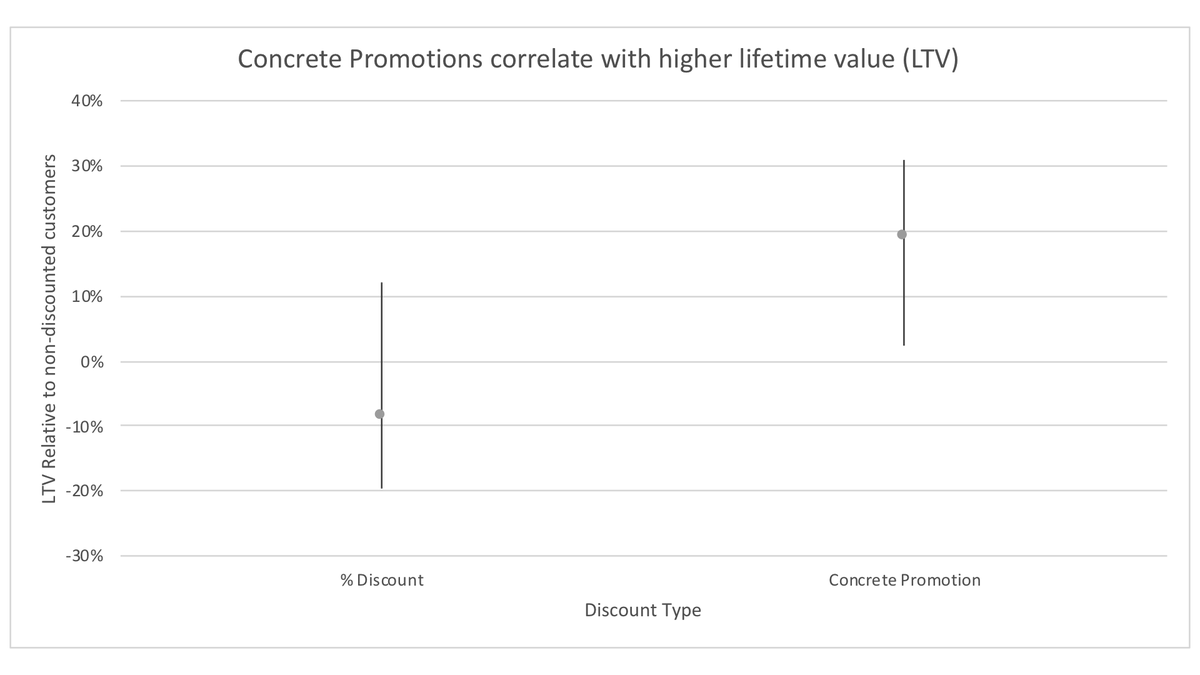Interesting discussion from @andrewjfaris, @TaylorHoliday, and @digitallynativ around discounts on #DTC Twitter.
Found the conclusion of "discounts are a scalpel, not a sledgehammer" right, but incomplete.
Here& #39;s some data from 4.2k sub ecom brands to help with the thinking. https://abs.twimg.com/emoji/v2/... draggable="false" alt="👇" title="Rückhand Zeigefinger nach unten" aria-label="Emoji: Rückhand Zeigefinger nach unten">
https://abs.twimg.com/emoji/v2/... draggable="false" alt="👇" title="Rückhand Zeigefinger nach unten" aria-label="Emoji: Rückhand Zeigefinger nach unten">
Found the conclusion of "discounts are a scalpel, not a sledgehammer" right, but incomplete.
Here& #39;s some data from 4.2k sub ecom brands to help with the thinking.
First - why discount?
Discounts lower the activation energy of a lead converting.
As Taylor mentioned, a promotion can diminish the trust gap, reframing the purchasing decision.
Where I quibble is with the depth of these discounts. 2/
Discounts lower the activation energy of a lead converting.
As Taylor mentioned, a promotion can diminish the trust gap, reframing the purchasing decision.
Where I quibble is with the depth of these discounts. 2/
Let& #39;s look at lifetime value (LTV) across 4.2k sub ecom companies, specifically the LTV of customers who received a discount at purchase compares to those who didn& #39;t.
Notice how as the discount increases, LTV decreases.
Why? 3/
Notice how as the discount increases, LTV decreases.
Why? 3/
Our thesis becomes: discounts leap the trust gap, but at a level the trust gap actually *widens* by the discount.
You& #39;ll get initial conversion, but not so great customers.
You could argue - more customers are better than less. Yet, here& #39;s why that& #39;s maybe not great... 4/
You& #39;ll get initial conversion, but not so great customers.
You could argue - more customers are better than less. Yet, here& #39;s why that& #39;s maybe not great... 4/
Look at NPS scores on our same scale.
Higher the discount, lower the promotion and WOM.
Maybe promotion doesn& #39;t matter, but less satisfied customers also churn like mofos.... 5/
Higher the discount, lower the promotion and WOM.
Maybe promotion doesn& #39;t matter, but less satisfied customers also churn like mofos.... 5/
Look at revenue churn based on discount at purchase.
Higher the discount, worse the churn.
It& #39;s hard to say whether this is ok or not. If I& #39;m a brand like DSC that doesn& #39;t make money on first purchase this is problematic. If I was @soundslikecanoe this is probably ok. 6/
Higher the discount, worse the churn.
It& #39;s hard to say whether this is ok or not. If I& #39;m a brand like DSC that doesn& #39;t make money on first purchase this is problematic. If I was @soundslikecanoe this is probably ok. 6/
There& #39;s an argument that discounting leads to new channels of new customers.
If you& #39;re expanding into an outlet model, this makes sense, but that& #39;s not discounting, that& #39;s merchandising mix targeting different customers.
Your core doesn& #39;t change, so this feels tangential. 7/
If you& #39;re expanding into an outlet model, this makes sense, but that& #39;s not discounting, that& #39;s merchandising mix targeting different customers.
Your core doesn& #39;t change, so this feels tangential. 7/
That being said - here& #39;s a curious data point.
When we look at our LTV split, bundling discounts work better than % discounts. Ie. offering a free gift with purchase vs. 20% off.
Bundles appear to correlate with increased LTV.
It& #39;s the deal, not the discount. 8/
When we look at our LTV split, bundling discounts work better than % discounts. Ie. offering a free gift with purchase vs. 20% off.
Bundles appear to correlate with increased LTV.
It& #39;s the deal, not the discount. 8/
So TLDR:
Discounting is more acquisition than pricing. It& #39;s a scalpel, not a sledgehammer that needs to be experimented with and executed well.
Results will vary, but:
- Offer promotions vs. % off.
- Be careful over 20%
- Don& #39;t do it out of pressure.
9/
Discounting is more acquisition than pricing. It& #39;s a scalpel, not a sledgehammer that needs to be experimented with and executed well.
Results will vary, but:
- Offer promotions vs. % off.
- Be careful over 20%
- Don& #39;t do it out of pressure.
9/
@TaylorHoliday, @andrewjfaris, and @digitallynativ hope this helps. Just wanted to add some good kindling to your arguments.  https://abs.twimg.com/emoji/v2/... draggable="false" alt="😂" title="Gesicht mit Freudentränen" aria-label="Emoji: Gesicht mit Freudentränen">
https://abs.twimg.com/emoji/v2/... draggable="false" alt="😂" title="Gesicht mit Freudentränen" aria-label="Emoji: Gesicht mit Freudentränen">
Figure @web and @magdalenakala will get a kick out of this too, so tagging them.
Happy to dig deeper or chat more, too. 10/
Figure @web and @magdalenakala will get a kick out of this too, so tagging them.
Happy to dig deeper or chat more, too. 10/
If you found this worth at least $1, you should retweet the whole thread. Want to get this knowledge into the hands of as many people as possible.
What other benchmarks or research would you like next? I can do a #B2B version of this easily. :)
/fin
What other benchmarks or research would you like next? I can do a #B2B version of this easily. :)
/fin

 Read on Twitter
Read on Twitter





